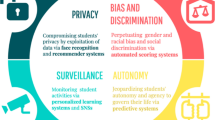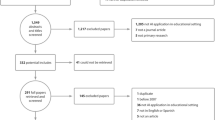Abstract
Artificial intelligence has become smarter with the growth in knowledge and expands the realm of possibilities for society. Recent research shows that great growth in the usage of Artificial intelligence in education. This is found that in the coming future, there will be more growth in it. The paper tried to cover some of the important points related to the study of Artificial intelligence in education. The first and foremost important thing is the framework of education using the Artificial intelligence concept further the benefits or quality of services achieved using it in education along with some challenges that are covered. Further, their usage applications are highlighted that helps researchers in finding its usability in their area. Then in the end the comparative study is done based on purpose, algorithm and outcome achieved using different intelligent algorithms in the different education research areas. This study also highlights the applicability of Artificial intelligence in a different sections of education which gives the efficient results.

Similar content being viewed by others
Data availability
Not Applicable.
Code availability
Not Applicable.
References
Zawacki-Richter O, Marin OV, Bond M, Gouverneur F: Systematic review of research on artificial intelligence applications in higher education—where are the educators. Int J Educ Technol Higher Educ. pp 1–27, (2019).
Agaoglu M: Predicting instructor performance using data mining techniques in higher education. In: IEEE Access, pp 2379–2387, (2016).
Borge MN: White paper—Artificial intelligence to improve education / learning challenges. Int J Adv Eng Innovative Technol (IJAEIT), pp 10–13, (2016).
Alexander, B., Ashford-Rowe, K., Barajas-Murphy, N., Dobbin. G.: EDUCAUSE Horizon report: 2019 higher education edition. Retrieved from EDUCAUSE Learning Initiative and The New Media Consortium website, pp. 1–44, (2019).
Xia P: Application scenario of artificial intelligence technology in higher education. In: International conference on applications and techniques in cyber security and intelligence, pp 221–226, (2019).
Cong D Research on the construction of practical teaching system of cloud education platform specialty in universities. Creation Sci Technol New Guide, pp 223–224, (2017)
Subrahmanyam VV, Swathi K Artificial Intelligence and its implications in education. In: International conference on improved access to distance higher education focus on underserved communities and uncovered regions, pp 1–11, (2018).
Maderer J Artificial intelligence course creates AI teaching assistant. Georgia Tech News Center, (2016).
Fahimirad M, Kotamjani SS A review on application of artificial intelligence in teaching and learning in educational contexts. Int J Learn Dev pp 106–118, (2018)
Ferguson R, Clow D, Beale R, Cooper AJ, Morris N, Bayn S, Woodgate A (2015) Moving through MOOCS: pedagogy, learning design and patterns of engagement. In: Lecture Notes in Computer Science (including subseries Lecture Notes in Artificial Intelligence and Lecture Notes in Bioinformatics), pp 70–84, (2015).
Kumar Y, Kaur KP (2020) Machine learning aspects and its applications towards different research areas. In: International conference on computation, automation and knowledge management (ICCAKM), pp. 1–6. IEEE, (2020).
Hillier J Performances and performativities of resilience. In Evolutionary governance theory: theory and applications, pp. 167–183. Springer (2015).
Kelley TR, Knowles JG, Abell S, Lederman N, Bandura A, Bandura A, Williams D: A conceptual framework for integrated STEM education. In: International Journal of STEM Education. pp 1–11, (2016).
Bayne S: Higher education as a visual practice: Seeing through the virtual learning environment. In: Teaching in Higher Education. pp. 395–410, (2008).
Ozbey N, Karakose M, Ucar A The determination and analysis of factors affecting to student learning by artificial intelligence in higher education. In: International conference on computer science and educational informatization (CSEI), pp 1–6. IEEE, (2016).
Kandlhofer M, Steinbauer G, Hirschmugl-Gaisch S, Huber P Artificial intelligence and computer science in education: from kindergarten to University. In: Frontiers in education conference (FIE), pp 1–9. IEEE, (2016).
Ilhan K, Music D, Junuz E, Mirza S: Scarlet—artificial teaching assistant. In: International conference on control, artificial intelligence, robotics & optimization, pp. 11–14. IEEE, (2017).
Wei Z Research on the teaching system of table tennis based on artificial intelligence. In: Sixth international conference on future generation communication technologies, pp. 92–95. IEEE, (2017).
Sun W, Gao X: The Construction of undergraduate machine learning course in the artificial intelligence Era. In: 13th International, pp 1–5. IEEE, (2018).
Kavitha P, Krishna Moorthy B, Sudharshan PS, Aarthi T: Mapping Artificial Intelligence and Education. In: International conference on communication, computing and internet of things (IC3IoT), pp. 165–168. IEEE, (2018).
Ciolacu M, Tehrani AF, Binde L, Svasta PM: Education 4.0—Artificial intelligence assisted higher education: early recognition system with machine learning to support students’ success. In: 24th international symposium for design and technology in electronic packaging (SIITME), pp 23–30. IEEE, (2018).
Lin P-H, Wooders A, Wang JT-Y, Yuan WM Artificial intelligence, the missing piece of online education engineering management review, pp 25–28. IEEE, (2018).
Yunfang Z, Yuexi W Interactive teaching path analysis of higher vocational ideological and political courses based on artificial intelligence algorithms. In: 11th international conference on measuring technology and mechatronics automation (ICMTMA), pp 458–461. IEEE, (2019).
Gao YM, Guo XY, Tong MS improvement on teaching microwave engineering course by incorporating the artificial intelligence technology. In: PhotonIcs & Electromagnetics Research Symposium, pp. 1047–1051. IEEE, (2019).
Funding
This work did not receive any grant from funding agencies in the public, commercial or not-for-profit sectors.
Author information
Authors and Affiliations
Corresponding author
Ethics declarations
Conflict of interest
The authors declare that they have no conflict of interest.
Additional information
Publisher's Note
Springer Nature remains neutral with regard to jurisdictional claims in published maps and institutional affiliations.
This article is part of the topical collection “Computational Statistics” guest edited by Anish Gupta, Mike Hinchey, Vincenzo Puri, Zeev Zalevsky and Wan Abdul Rahim.
Rights and permissions
About this article
Cite this article
Verma, A., Kumar, Y. & Kohli, R. Study of AI Techniques in Quality Educations: Challenges and Recent Progress. SN COMPUT. SCI. 2, 238 (2021). https://doi.org/10.1007/s42979-021-00635-3
Received:
Accepted:
Published:
DOI: https://doi.org/10.1007/s42979-021-00635-3




